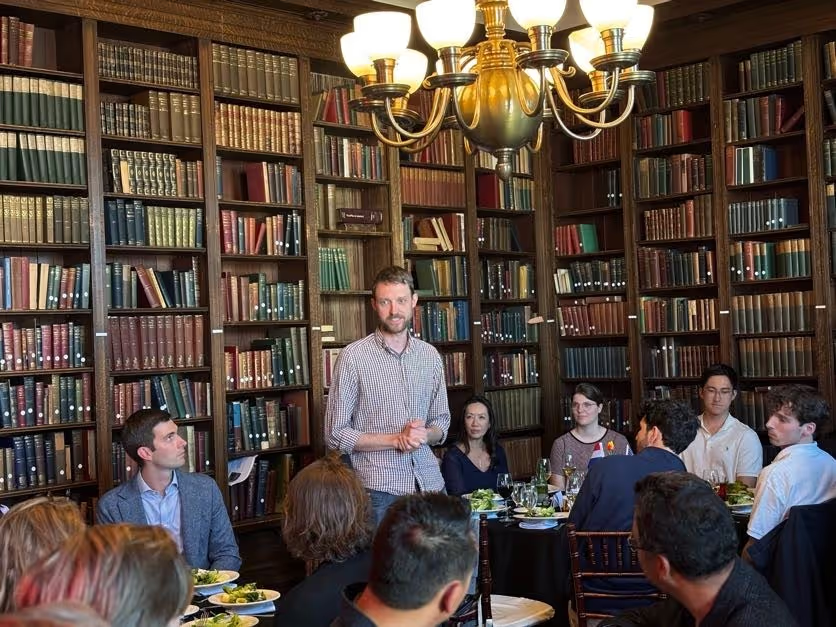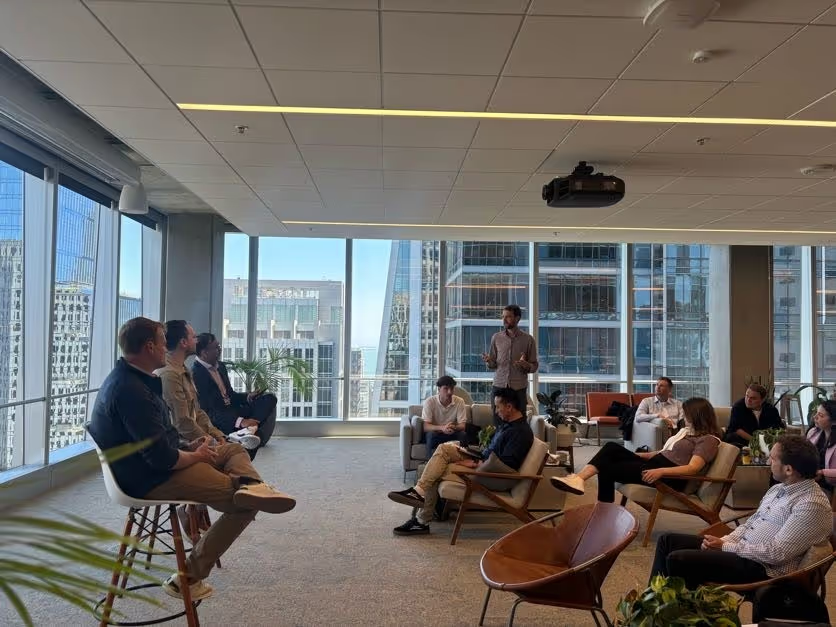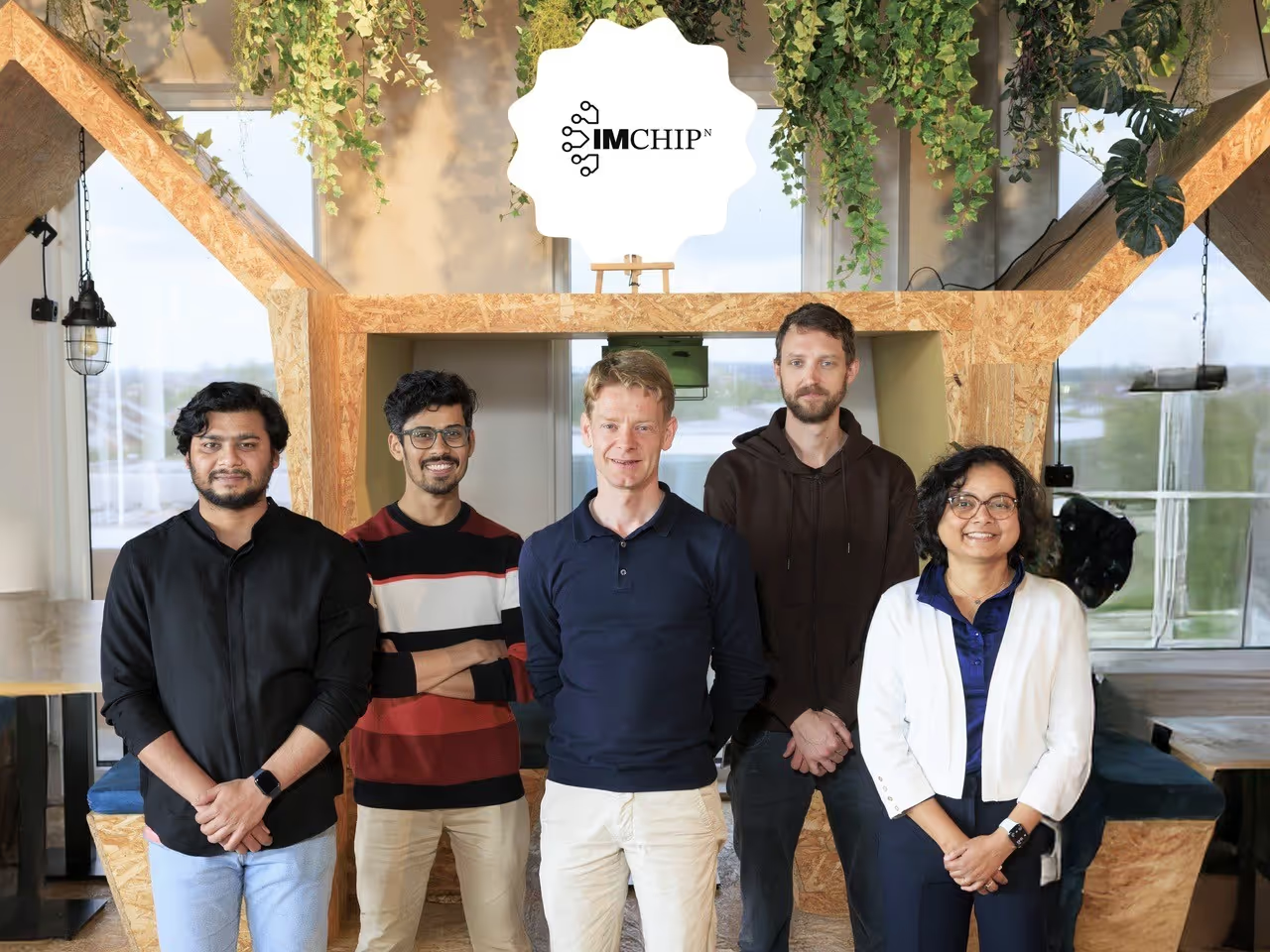Waarom Ruben Hamming-Green met IMChip AI-chips wil revolutioneren vanuit het noorden

IMChip
I left for a reason.
Zegt Ruben Hamming-Green over zijn vertrek uit Amerika tien jaar geleden. Nu keerde hij als ondernemer terug naar zijn geboorteland. Niet om te blijven, maar om te leren. De Amerikaan die Nederland zijn thuis maakte, ontwikkelt met IMChip energiezuinige AI-chips die de fundamenten van computertechnologie zouden kunnen veranderen. "AI will be the world's fourth largest economy regarding energy consumption.”
Tegen de stroom in
Ruben's verhaal begint anders dan de meeste ondernemers. Tien jaar geleden maakte hij de overstap van Amerika naar Nederland. Tegen de stroom in. "The scale here is just so different than in the US. Over there, the same amount of people would be spread out over an area where it would take an hour to drive across town."
Die keuze voor Nederland was bewust. Waar veel Europese ondernemers dromen van Silicon Valley, zocht Ruben juist de rust van het Nederlandse systeem. "In the Netherlands, people are a bit more reserved. It feels like less of a big social club." Die nuchterheid sprak hem aan na jaren Amerikaanse startup-cultuur.
Via zijn PhD in materiaalwetenschappen aan de Rijksuniversiteit Groningen kwam hij in contact met professor Tamalika Banerjee, die al jaren onderzoek deed naar memristoren. "She had the idea to start this company and reached out to me. I had worked with her previously."
Het energieprobleem van AI
Ruben legt het probleem uit dat IMChip oplost: "Normal computers are built around silicon-based transistors. The way a transistor operates is either on or off. So current is flowing or no current is flowing. Everything is just zeros and ones."
Dat werkt voor traditionele computing, maar AI is fundamenteel anders. "What we're doing globally is making a move towards AI. This is a paradigm shift. It's no longer deterministic, it's more associative. The ideas for AI come out of neuroscience originally, not from the computer world."
Het energieprobleem wordt steeds urgenter. "AI is really energy intensive. It's running in datacenters, they use megawatts of power. It's an absurd amount of energy. This makes it a really unsustainable industry at this point."
We took it very seriously because we're all academics by nature. I didn't know anything about companies at all.
Chips die werken zoals hersenen
IMChip's oplossing ligt in nieuwe materialen. "There are materials that already have synaptic functionality. They remember the history of what has happened to them. You can give a strong voltage spike and modify the resistance continuously."
In plaats van AI te simuleren met traditionele transistoren, bouwt IMChip chips die daadwerkelijk werken zoals hersenen. "Instead of having transistors simulating a synapse, you have a single device that is one synapse and really acts like a synapse. There's a physical change happening that is preserved."
Het verschil is gigantisch. "You can condense the footprint quite dramatically. You just have this collection of synaptic devices. They use a lot less energy, and they don't forget just because you don't supply them power."
Van academisch onderzoek naar startup
IMChip werd opgericht in november 2024, maar bouwt voort op jaren onderzoek. "The academic research has been going on at this institute for around six years. So the research is quite robust at this point."
Voor Ruben was de overstap van academicus naar ondernemer zorgvuldig gekozen. "We took it very seriously because we're all academics by nature. I didn't know anything about companies at all."
Het team bestaat inmiddels uit vier wetenschappers en een business developer. "We're all physicists or chemists. We study these novel materials that act in new ways."
It sounds very nice and promising. In reality, it's very complicated.
Realisme over uitdagingen
Ruben is eerlijk over obstakels. "It sounds very nice and promising. In reality, it's very complicated." Het grootste probleem is dat de chipindustrie 70 jaar heeft geïnvesteerd in silicium. "Everyone knows what to do with silicon, but it's still limited because of these zeros and ones."
IMChip probeert nieuwe materialen te integreren in bestaande processen. "We're trying to embed new materials into chips to bypass this fundamental limitation of silicon. The pathway to the market is very long because you're integrating new materials into a very well-known process. There are many unknowns, and it's not totally clear that it will work. We think that we have a process to do it, but scaling it up and industrializing it. That's what we're working on."
De financiering verloopt voorspoedig. "We got funded recently through Future Tech Ventures. We're also securing grants and subsidies."
What was really hammered in again and again was: just focus on the absolute most simple element that you can do, and just do that really well. This is a paradigm shift for me.
Als ondernemer terug naar Amerika
Via de Academic Startup Competition keerde Ruben terug naar Amerika. "It was definitely different because it's a world I hadn't been exposed to while living there. It's quite accurate what you hear about startup culture, and it's a pretty weird place to be."
De cultuurverschillen vielen hem op. "There's an energy that comes with it. People are really interested in what you're doing. In America, it seems like people spend all day meeting people and connecting. They always know someone who is available for something."
De reis leverde waardevolle contacten op. "In the chip industry, it's such a global industry. There's people working all around the world that we probably have to partner with. These type of meetings, I did get quite a few connections out of the trip."
Lessen in eenvoud
De belangrijkste les uit Amerika was focus. "What was really hammered in again and again was: just focus on the absolute most simple element that you can do, and just do that really well. This is a paradigm shift for me."
Voor academici is dat counter-intuïtief. "As academics, we want to explore everything. You're trained to dive into all the details and really understand something deeply. But we actually just want to make it and get it working. We can figure it out later."
Ondanks zijn Amerikaanse achtergrond ziet Ruben voordelen in Nederland. "Here, people immediately tell you how things work, saving you months of trials and errors." Die directheid waardeert hij na Amerikaanse omwegen. Ook de kleinschaligheid helpt. "If you know a few good people, you have access to the whole ecosystem. We have a good university, the right knowledge and expertise.”
You can't just send a cold email. They're not interested. You have to find the person in the company that is willing to have a chat
Partnerships als noodzaak
Voor IMChip zijn partnerships essentieel. "It's incredibly expensive to develop chips and we're doing something new. So we have to partner with people." De reis naar de Verenigde Staten hielp bij het leggen van nieuwe contacten.
"You can't just send a cold email. They're not interested. You have to find the person in the company that is willing to have a chat. But if you are meeting people in person that already have connections, they just tell them what you're doing, and you can set up a meeting."
Toekomstvisie: AI revolutioneren
Ruben's ambitie is helder: "Theoretically, what we're going for is to make chips for data centers to really reduce power consumption. If it really works out, then AI will not run on these silicon chips we're using now. They'll run on these new materials."
Hoe de tijdlijn eruit gaat zien, hangt af van financiering. "If we can get a couple million euros and hire some people and get the machines we need, it could be within a couple of years."
Het beste van twee werelden
Voor andere ondernemers heeft Ruben advies: "Focus on the absolute most simple element. Don't explore all the side details, just do this one thing really well." Die Amerikaanse les past hij toe vanuit Nederland. Vanuit Groningen werkt hij samen met zijn team aan een mogelijke oplossing van de energiecrisis van AI. Lokaal werken aan globale problemen gebeurt gewoon in Groningen.


